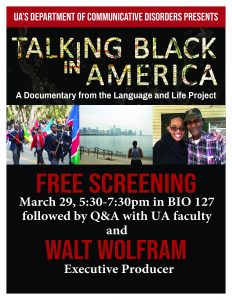 TUSCALOOSA, Ala. — Sites like the Urban Dictionary would not likely exist without the contributions to American English that have been made by black Americans.
TUSCALOOSA, Ala. — Sites like the Urban Dictionary would not likely exist without the contributions to American English that have been made by black Americans.
Words and phrases like “wassup,” “chillin,” “what it do?,” “crackin” and “jawn” have sprang from the creative minds of black Americans and been woven into popular culture.
To explore the history and importance of black American English, the department of communicative disorders is hosting a free screening of the new documentary “Talking Black in America: The Story of African American Language,” a documentary from the Language and Life Project.
The documentary, which is the first documentary to portray the most controversial and misunderstood language variety in the history of American English, will be shown March 29, from 5:30-7:30 p.m. in room 127 of the Biology Building.
A Q&A with UA faculty and the documentary’s executive producer, Walt Wolfram, will follow.
“This film tells the historical and social history of African-American English, one of the most studied yet still widely misunderstood varieties of American English,” said Dr. Paul E. Reed, UA assistant professor of communicative disorders. “This story is crucial as the systematic and rule-governed nature of AAE is often overlooked and/or ignored.
“The historical biases against and prejudice toward African-Americans is often expressed toward the language, and it is often ridiculed or dismissed as some type of mistake-filled broken language. Such statements could not be further from the truth. The story of how African-American English came to the U.S., how it has spread, its impact and its continuing development is one that deserves to be told.”
According the film’s abstract, the documentary examines the historical roots of African-American language, its contemporary status in society, its essential role in everyday life and its critical utility in artistic performance.
The documentary is built around the comments and activities of everyday speakers and performers reflecting real world experiences, curated alongside the observations of linguists, historians and educators. It showcases the development and changing role of language in the lives of African-Americans, as well as the impact it has had on the speech and culture of the United States and beyond.
The documentary confronts the persistent stereotypes and prejudices about African-American language and makes it clear that it is a part of the cultural legacy of all Americans.
The documentary was filmed in the Caribbean, the South Carolina Sea Islands, the rural South and metropolitan areas of the North.
Reed said the faculty within the department of communicative disorders are lovers and scholars of language in all its varieties, so sharing this film with the public is an honor and a good way of engaging with the greater Tuscaloosa community.
“We know that language is one of the most, if not the most, important aspects of a speaker’s personal and cultural identity,” he said. “…The story of African- American speech follows the unique circumstances of the descendants of American slaves and their incredible impact on American language and life.
“The resonant cadences, rhythms and expressiveness of African-American speech reflect the imprint of African language systems, the influence of regional British and Southern English, and the creativity and resilience of people living through oppression, segregation and the fight for equality.”
The film’s producers/directors are Neal Hutcheson and Danica Cullinan.
Contact
Jamon Smith, communications, jamon.smith@ua.edu, 205-348-4956
Source
Dr. Paul E. Reed, pereed1@ua.edu, 205-348-1842, 901-896-6999,
